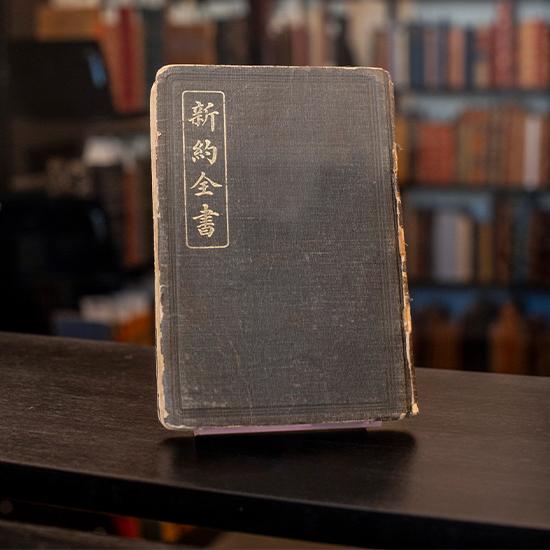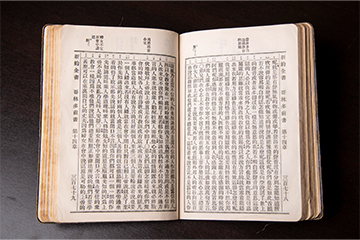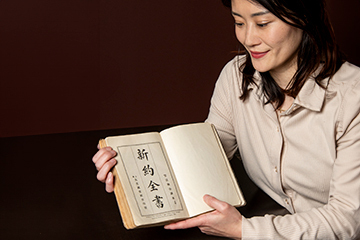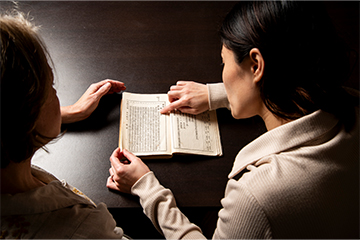Chinese Union Version Bible at Pepperdine’s Payson Library Testifies to a Global Church

Since its release in 1919, the Chinese Union Version of the Bible has become the holy book’s most prominent and widely embraced Chinese translation. Despite numerous changes to the Chinese language and a considerable increase in new translations over the years, its significance in the Chinese Christian community remains indisputable. The scripture is a translation of the Mandarin New Testament and its long-standing popularity is due to its use of the national language and not the local vernacular. The Chinese Union Version’s simple word structure is easily understood by people across the socioeconomic spectrum and it is faithful to the original text without losing the rhythm of the Chinese language. This translation of the scriptures has been crucial to the development of Christianity in China and has facilitated access to the word of God for millions of Chinese Christians.

Liang (Joy) Qiao (MSML '19), assistant director of marketing and communications for Alumni Affairs, discovered the Chinese Union Version of the Bible during a recent visit to the Boone Special Collections and Archives reading room at Payson Library. The department houses a variety of distinctive and scarce physical artifacts, spanning from medieval manuscripts to 20th-century film reels. It serves as a sanctuary for items of enduring historical and spiritual significance where cultural heritage is preserved and cherished.
“Pepperdine’s Special Collections offers a way for us to experience the past. The physical aspects of these materials and artifacts that the University collects can lend insight into the culture and intellectual spirit of a specific time period,” shares Lucy Perrin, director and archivist for the Rushford Center and the Churches of Christ Heritage Collection. She adds, “Preservation is such an important aspect of what we do in the Libraries. These books are going to naturally disintegrate, and if you can keep one in your preservation environment, that will extend its natural life. You might be able to still look at these 500 years from now.”
Dean of Libraries Mark Roosa notes that housing and providing texts such as the Chinese Union Version, one of the many foreign-language Bibles available in Pepperdine Libraries’ Special Collections, demonstrates the University's commitment to belonging. “These texts contribute enormously to sharing the word of God broadly and to the University's commitment to cultivating a community of belonging among faculty, staff, students, and alumni.”
Qiao, who originally arrived at Pepperdine as an international student from China, found comfort, familiarity, and acceptance in being able to access scripture in her native language.

“It was exhilarating to discover that this Bible is in Pepperdine’s Payson Library because it was an important book in my household. We took it to church every week,” Qiao shares. “It is essential to share these diverse scriptures with the broader student population, especially for international students, as they continue to study and grow in the Christian faith-based community.”
This year marks the 105th anniversary of the publication of the Chinese Union Version of the Bible, and its creation remains an important historical moment for Chinese Christians today.
“What is so valuable about this Bible is its longstanding impact and the detailed dedication to understandable language while maintaining the accuracy of messages,” Qiao remarks. “This version of the Bible took the translators 16 years to complete and represents a significant milestone in the advancement of the Chinese Christian community.”
Many of the University’s rare books are acquired through donations, while others are obtained by the Special Collections team who procure important and historical pieces for the Libraries’ archives. Perrin shares that Pepperdine continuously looks for opportunities to advance the Libraries’ collections to elevate both research for students and teaching materials for professors.
“We are constantly asking ourselves, ‘What are we missing? What could enrich our teaching collection?’ and aim to be purposeful and thoughtful with the content we collect,” says Perrin. “Our primary goal is to make sure we are using our materials to instruct students and, secondarily, provide research and texts for professors that are interested in specific topics for their classrooms.”

In addition to the Chinese Union Version of the Bible, the University’s collection includes other foreign-language Bibles, such as the London Polyglot Bible (1657) on loan from the Ramsey family that contains the biblical text side by side in nine languages—Hebrew, Samaritan, Aramaic, Greek, Latin, Ethiopic, Syriac, Arabic, and Persian—the Latin Vulgate Bible (1769), the Kalmyk Oirat Bible (1887), the Braille Bible (1952), the German Bible (1850), the French Bible (1768), and the Hebrew Torah Scroll (undated).
Pepperdine’s collection of rare multilingual Bibles affords the opportunity to examine a multitude of translations of scripture and preserves multicultural pieces of historical significance. According to Perrin, making Bibles accessible in the heart languages of people from around the world gives us all a shared story through the word of God.
“For those who speak more than one language or do comparative studies among languages, reading the texts side by side can shed light on the fullest meaning of the scripture,” Perrin says. “It can also build bridges across cultures and open the door for deeper relationships between Christians from around the world.”
Individuals interested in viewing the Chinese Union Version of the Bible or any of the rare books and manuscripts within Special Collections can email specialcollections@pepperdine.edu to schedule an appointment.